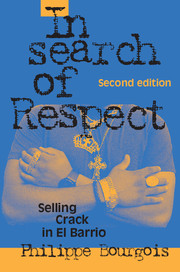Book contents
- Frontmatter
- Contents
- Acknowledgments
- Preface to the 2003 Second Edition
- Introduction
- 1 Violating Apartheid in the United States
- 2 A Street History of El Barrio
- 3 Crackhouse Management: Addiction, Discipline, and Dignity
- 4 “Goin Legit”: Disrespect and Resistance at Work
- 5 School Days: Learning to be a Better Criminal
- 6 Redrawing the Gender Line on the Street
- 7 Families and Children in Pain
- 8 Vulnerable Fathers
- 9 Conclusion
- Epilogue
- Epilogue 2003
- Notes
- Bibliography
- Index
- Other books in the series
3 - Crackhouse Management: Addiction, Discipline, and Dignity
Published online by Cambridge University Press: 05 June 2014
- Frontmatter
- Contents
- Acknowledgments
- Preface to the 2003 Second Edition
- Introduction
- 1 Violating Apartheid in the United States
- 2 A Street History of El Barrio
- 3 Crackhouse Management: Addiction, Discipline, and Dignity
- 4 “Goin Legit”: Disrespect and Resistance at Work
- 5 School Days: Learning to be a Better Criminal
- 6 Redrawing the Gender Line on the Street
- 7 Families and Children in Pain
- 8 Vulnerable Fathers
- 9 Conclusion
- Epilogue
- Epilogue 2003
- Notes
- Bibliography
- Index
- Other books in the series
Summary
Hell, yeah, I felt good when I owned the Game Room. In those days everybody be looking for me; everybody needed me. When I drove up, people be opening the door for me, and offering to wash my car. Even kids too little to understand anything about drugs looked up to me.
FelixThe logistics of selling crack are not dramatically different from those of any other risky private sector retail enterprise. Selling high-volume, inexpensive products is an inherently boring undertaking that requires honest, disciplined workers in order to be successful. Such businesses are inherently rife with traditional management versus labor confrontations, as well as internal jealousies or rivalries within employee hierarchies. It is only the omnipresent danger, the high profit margin, and the desperate tone of addiction that prevent crack dealing from becoming overwhelmingly routine and tedious. The details of how the Game Room was run during the years I lived next to it provide a good example of these dynamics.
Living with Crack
Ray did not found the Game Room. The person who actually established the 250-square-foot video game arcade as a crackhouse was a childhood friend of his named Felix, who was also Primo's first cousin. Felix did not run a tight operation; he reveled too much in street-corner glory and consequently did not insulate himself from the police by hiring a manager, or at least some intermediary worker-assistants, to make the actual hand-to-hand sales.
- Type
- Chapter
- Information
- In Search of RespectSelling Crack in El Barrio, pp. 77 - 113Publisher: Cambridge University PressPrint publication year: 2002



